The search for marketers has always been and still remains a sensitive subject for game-dev industry. Positive developments took place last year: organisations separated operations out into separate marketing departments more frequently. Doing so helps to understand better who are you looking for and to simplify the search itself.
Although there are some who work the old-fashioned way and make the usual mistakes. Last year on White Nights, Tatiana Loktionova, founder of full-service company VALUES VALUE (VV), gave a presentation called ‘You will never find a marketer this way’ that focused on how to make game-dev studios seek marketing experts properly and how to produce the results as a well-configured process and the real income from games. In that regard, we provided some key messages.
It described the main issue surrounding finding marketers and gave some practical solutions. Tatiana Laktionova and her colleague Alina Mudraya, Head of Recruitment at VV, spoke of what retains marketers in a company and how an employer can protect themselves against poaching from other companies at this year conference held on the 17th of October at Moscow.
Who are marketers in game-dev
There are almost no marketers per se in game-dev. The only person you could definitely call that is the Chief Marketing Officer (CMO), and that would only be appropriate if they are really responsible for a product and product vision at the conceptual stage through development etc. So what do they, especially top-managers and HR-managers, call marketers in gamedev? They seek, for the most part, not User Acquisition Managers (UA) but Traffic Managers. Although calling the people ‘traffic’ isn’t entirely appropriate. Such a case of transference reveals itself when we, as a recruitment company, really begin to understand which people a game-dev company we are working with needs. And it doesn’t matter if it’s a well-established company or the one that is only just launching its marketing activity.
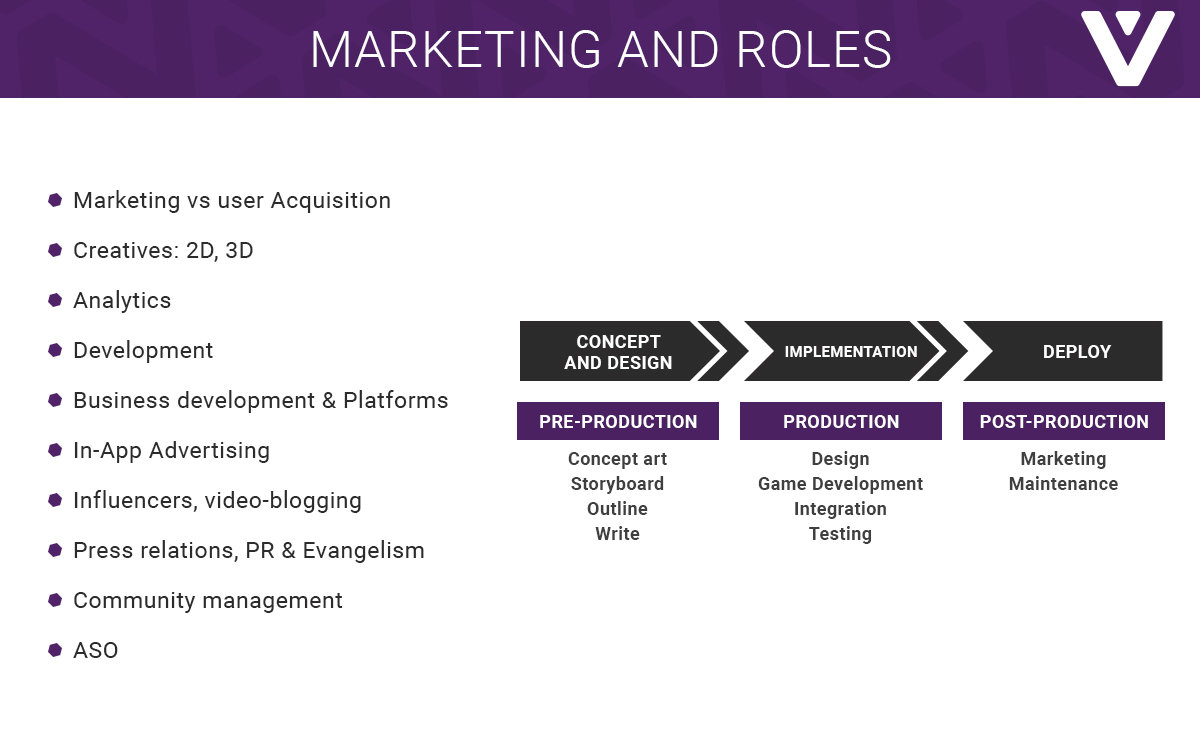
Marketing is an enormous system: purchases, creatives, analytics and even Python-development. Organisations need to communicate with platforms to figure out where to gain traffic, to collaborate with partners and to pry out the advantages of analytic systems. It’s important to realize who is going to be responsible for in-app advertising, in-game advertising, vlogging (you are not cool if you are not into it yet). Of course. it’s unnecessary to make a position for every point but a distribution of all roles is necessary.
Relationships with media, competent PR and even some kind of evangelism in the classic big marketing sense are still relevant. Usually I assign community-management and App Store Optimization (ASO), not to mention electronic mailing lists, to the marketers. All of the above is only the beginning. And a marketer, especially if they are on their own, often has to do all of this at the same time.
A simplified overview of the business-process in game-dev is pre-production, production and post-production. We can see that marketing there takes the back seat in post-production even though its operational system is much wider. User Acquisition should start in pre-production. The marketer, per se, is like a Product Owner or Producer who is allowed to create a concept, select the target audience, analyse the market, create a vision of the next product to produced. Everything else is during post-production when it’s necessary to attract as many users to the game as possible. Unfortunately, hardly anyone thinks about it, but that’s why exactly there are so many issues in finding a good marketer for a company and to find a good job for a marketer.
What is the problem?
Once I posted on Facebook ‘Does anyone need a traffic-lead marketer?’ Fourteen companies responded to the call saying ‘Yes, we are always looking for someone to do that’. Meanwhile, only two of them offered a CMO or UA Lead position on their website. Which means that majority of the companies are seeking but keeping quiet.
Let us suppose that I’m a CMO; I’m fed up with my company and I want to go to another one. I open a website of a desired studio or job portal, but there is nothing out there. I will probably think that nobody needs a CMO, but that isn’t true. Every organisation needs it. Companies just don’t advertise this because they would like not to offend the current CMO. They don’t know what they really need or there might be other internal reasons.
Why is it so complicated for organisations to figure out what they really need? Don’t they analyse their fundamental business process to understand what kind of marketer they need and at what stage? Or are they inclined to confuse marketers and UA Managers? But surely, there are big differences in approach to seeking marketers. It depends on whether the company focuses on the mobile market or on the social sector and whether it makes great games. Experience in big UA or marketing affects things as well.
Because of its diversity, UA Manager probably is the most difficult position. There are many variations on what they call themselves and what are they called in companies. They can be a Traffic Manager, Affiliate Manager, Media Buyer, PPC Manager, User Acquisition Manager, Traffic Arbitrage Manager etc. If we add to this Russian versions of the names as well we’ve got absolutely nonsense.
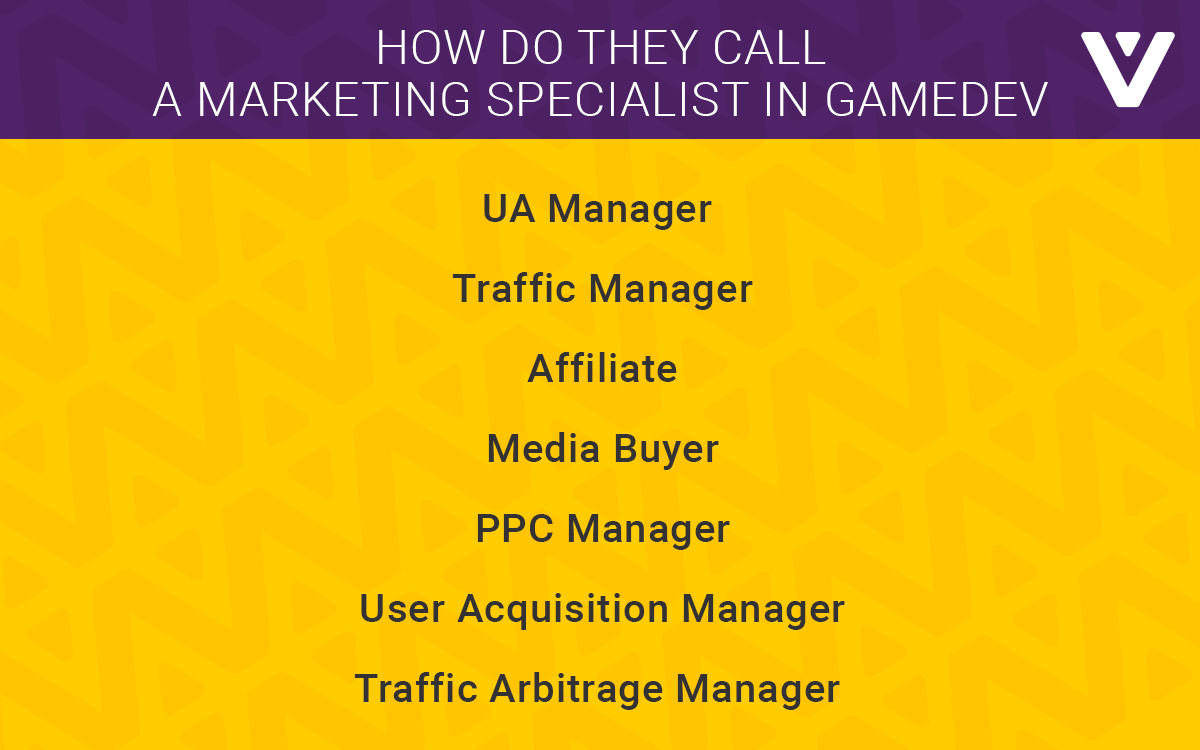
Trust me, marketers, Traffic Managers would change their jobs more frequently and they would be easier to headhunt if all their positions had the same name. Let’s imagine, for example, a UA Manager that goes to HeadHunter and looks for the position with the name Media Buyer, because right now he holds such a position. But there are only two companies seeking a Media Buyer, and this person doesn’t even realize that there are twenty more key words they could use to find some good suggestions.
The organisations don’t figure out what are they looking for and in so doing, don’t make a thorough analysis of the competitive environment. For our company, personally, such a situation brings only benefits. Clients come to us and we successfully look for a CMO and Traffic Leads for them. Nevertheless, we would like game- dev studios to learn how to handle such problems on their own.
What do companies wants from marketers?
To understand what employers want, we have identified all open positions we could only find in Russian for CMO and UA Leads and made a summary table of requirements and objectives. We found out that CMOs are required to have management skills, inspire a team, speak English, be aware of marketing basic frameworks, have work experience in such fields etc. You’d say ‘That’s great!’ Yes, but only at first glance. Because after all of this a CMO will have the main objective – marketing budgetary management. But hold on, was this requirement mentioned anywhere? It turns out it wasn’t.
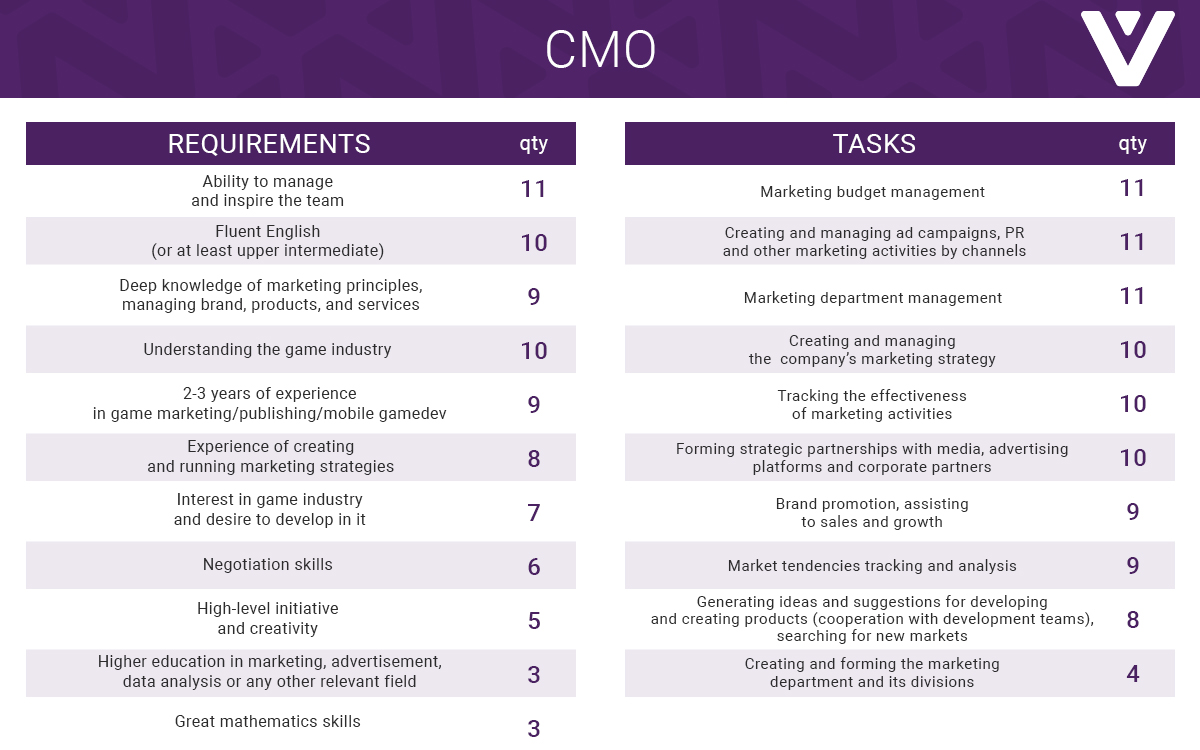
So we would like to get a magnificent, amazing and wonderful English-speaking management leader that would inspire their workers, but the first thing they have to do, as in their main objective, is budgetary management.
Dear friends, your requirements should be measured against objectives. In your requirements you need to specify what you really want from the person. They shouldn’t have to guess about their tasks: people primarily look at the requirements. Do you want to find a normal person? Specify exactly what you really want from them, and write exactly what you need.
How do we usually describe a position? We follow the rule ‘how others did it’. We look at the amazing descriptions for positions by Wargaming or Playkot, copy them and then we are looking for… a head of marketing for Playkot. But they wrote the description for their needs: they described a person that they need but not a person that you need. That’s why don’t copy. Describe your own requirements.
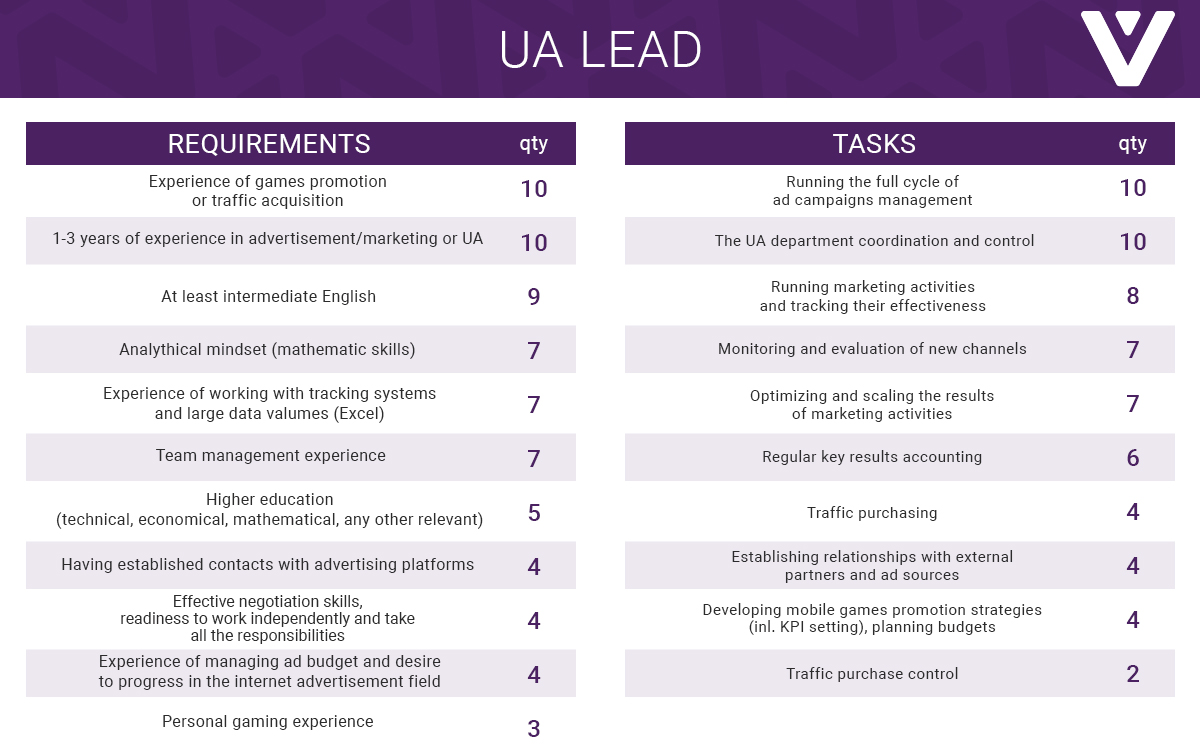
The situation with UA Leads is a little bit better. As we can see, companies basically understand who are they looking for. In this case the main obligations and objectives are congruent.
Then let’s try to compare what companies want from a CMO and a UA Lead. We can see that if we reinforce and average the objectives, both of the positions are required for the same thing, but actually this is the wrong approach. So what is the difference between a CMO and a UA Lead?
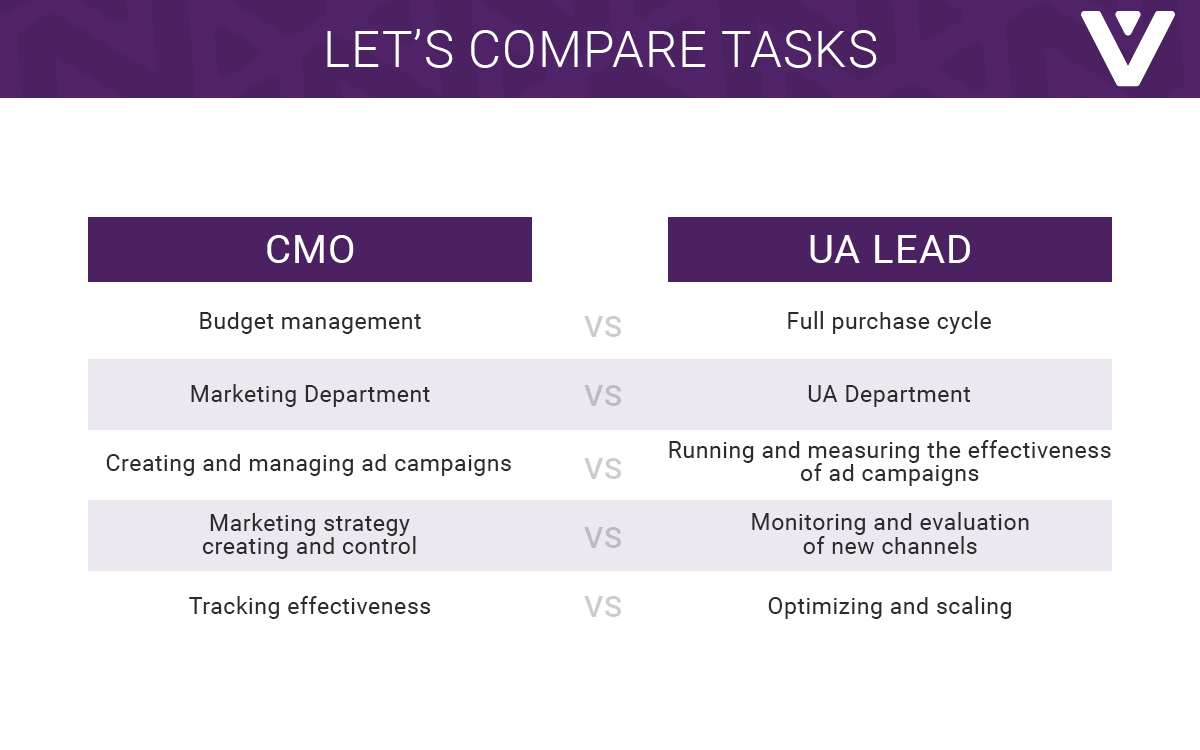
A CMO’s product and a producer’s product are pretty familiar: this is being a commercially successful, popular with the target audience game. The main Traffic Lead’s and UA Lead’s product is money. That’s why if you are looking for such a specialist, you need to hunt them with money. Unlike classic marketers, where you should draw attention to objectives.
How to seek properly?
First and foremost you have to understand why you need a CMO or UA Lead. You need to make a realistic assessment of the situation. For example, if you have a lot of non-turnover money and you fail to receive enough income. If you purchased more, you would earn more right now. That means that you need a person that would help you to turnover this money.
It’s a great primary problem statement for a recruiter. But if you want to make a ground-breaking product or get a new product to the market, this is just another kind of hurdle. Then you need to understand and revise the structure of the company, who holds which position and who reports to whom. Everything depends on it. If you hunt an awesome CMO with the words ‘Come to us, you will report to a producer’, he or she won’t come. In the structure the CMO must report to the CEO or COO (Chief Operating Officer). How successfully you fill a position depends on the structure. To make your life easier you should describe a position in as much detail as possible: what skills this person must have, how they should work, what experience they have, etc. Imagine the perfect applicant and describe them specifically for your company. Also you need to think about where they might be working already. Actually, if you understand the market you can easily see the results of their job.
Always clarify monthly procurement volume when you close top-positions. It’s especially important for start-ups or small companies that were in stagnation and then suddenly made a good product! Knowing the procurement volume helps a recruiter to find a good specialist. ‘Right now you procure $30 000 and your project has been on soft-launch for a year. I know that initial purchase of your company was no more that $30K. So come to us and you’ll have a $300,000 turnover’. Figure out your future procurement volume on your own and then convey this message to your recruiting team.
I highly recommend start-ups deal with advertising agencies. Don’t think a messiah, the most awesome marketing director will come and lead you to heaven. No matter how great your candidate, they don’t know your company and your product, and it’s not an exact science. They need some time to build processes. They will configure analytics, negotiate about prices and go through the stage of the first marketing budget drain. Usually companies decide that an expert has been doing nothing for three months and start to look for a new specialist. In the end marketing becomes too expensive due to the constant search for a CMO and UA Leads and their recruitment. You just waste your time, budgets and efforts. So much easier to ask an advertising agency, because they also educate sometimes. For example, for $5,000/month they would teach a specialist that fits your company’s values that you have found separately. While they are learning, your company works anyway. And it costs much less than if you’d hired the wrong person right now.
For experienced companies I recommend: if you have enough time, look for experts independently. Always monitor the market in passive mode, look for all kinds of marketers, traffic managers that you can find. Don’t lose sight of anybody. There are few savvy and experienced experts. At the first stage look for people with who can slam dunk. Posts on HeadHunter won’t work in this case: you should only use straight search, with the exception of cases where your HR-brand is strong. That’s why you’d better think where would you ‘get’ them from. At first you should try looking at game companies pretty similar to your company in procurement volume, genres, platforms, and then you should expand your search according to your hierarchy and requirements for the specialist. Also you can look over the web and agencies. Sure, they are often blamed for using bots and for ignoring non-machine work. But there are also some good experts. But even if you’ve learnt this negative lesson once, it doesn’t matter at all that all the webs and agencies worked badly. They are very experienced, and do a great deal of work.
Teach your experts. Almost all great companies scale marketing up and start to build a learning system for the newcomers who are not experienced in procurement. I’d like to add here one more lifehack on how to find a top expert. Don’t only look for people that are a CEO today. Their right-hand man (or ‘left-leg man’) can turn out to be a promising employee. Maybe they won’t grow up in that company, but they could hold the position of UA Lead or CMO in your company.
Using networking is one of the most important points for everybody. For example, if there is a new chat on Facebook or Telegram for Traffic Managers and CMOs, and here I am, I join it, because there are or will be 1,000 members that I could look for. Even if I’m banned there as a recruiter, I’ll make lots of screenshots with their names. Follow the industry, visit conferences such as White Nights, sit in the hall and catch the people near the exit. Follow the companies that hire many Traffic Managers. If they do, there are people who teach them, there are some savvy experts and they will have had some experience.
Finally, when you determine exactly who you need, ask yourself ‘Why does the person I’m looking for need me?’. Based on my experience, marketers usually lack authority. This thesis is true for most of right-hand men and ‘left-leg men’. They will be pleased to come from their leading, market-leading companies to your company only because you promise them more authority and less bureaucracy. So you give them an opportunity to influence decisions and do something without waiting for bureaucracy from the top. Keep in mind, if they make decisions, they will expect you to share your money with them. It is not like the old days, when the CMO were promised $2-3,000 in addition. Today Marketing Officers want a percent from the procurement: ‘I procured $300 000 per month with such a ROAS (Return of Advertising Spend) and now I want to get my cut’. All of this you have to think through when recruiting. As I said before, the CMO is easier to headhunt with objectives, and this means you need to offer them a job with interesting prospects.
And in conclusion I will only say one thing – seek and you shall find. So if you want your searching to meet with success, ask yourself only two main questions before you start:
Who do I need and why?
Why do they need me?
Watch the full lecture (rus)
